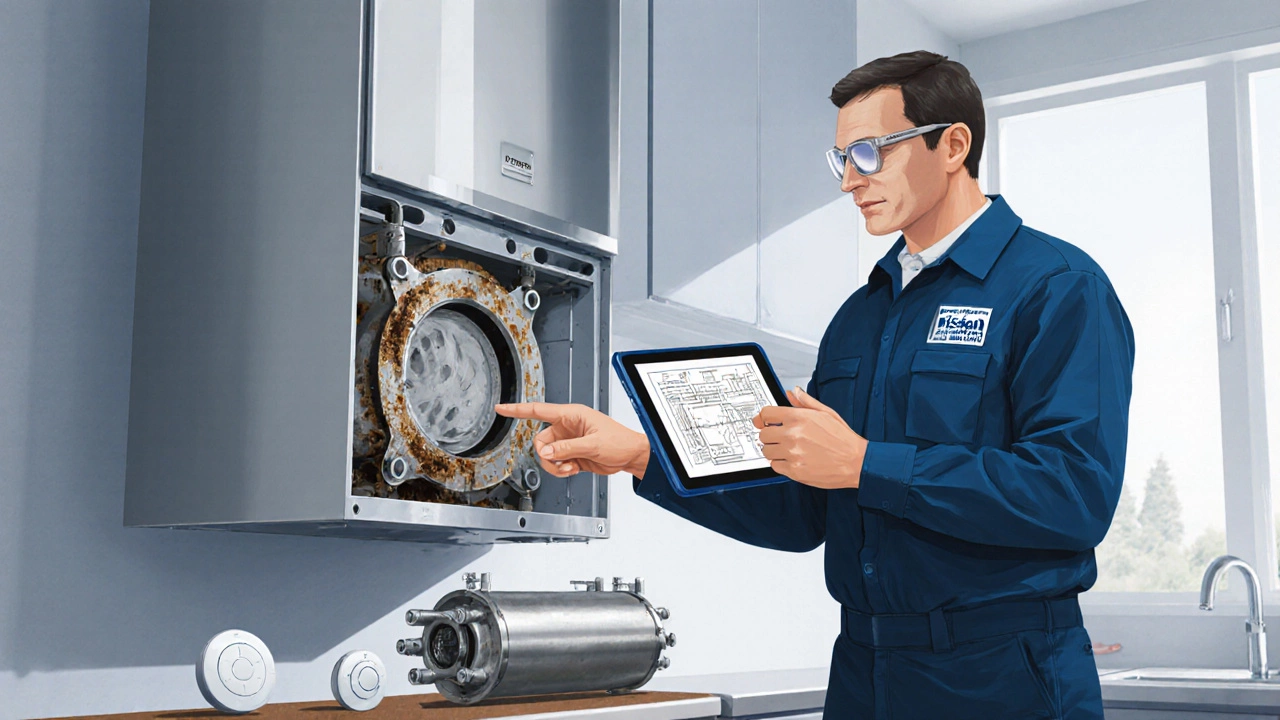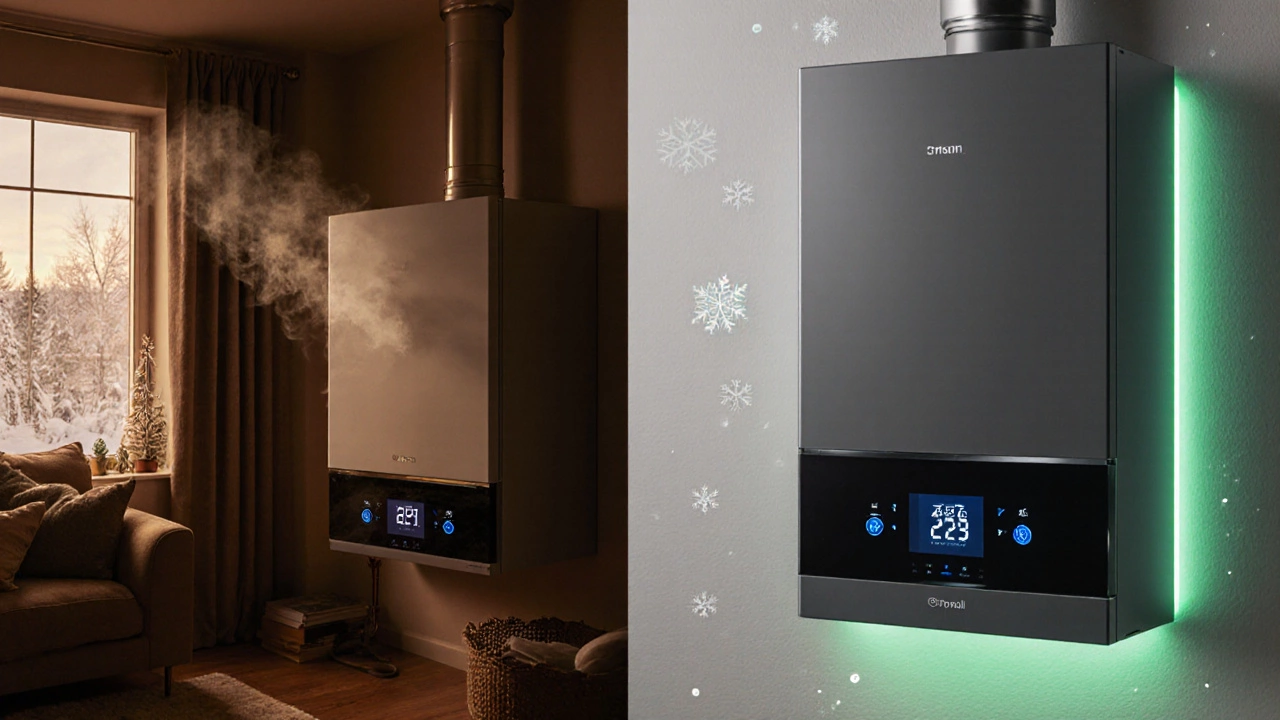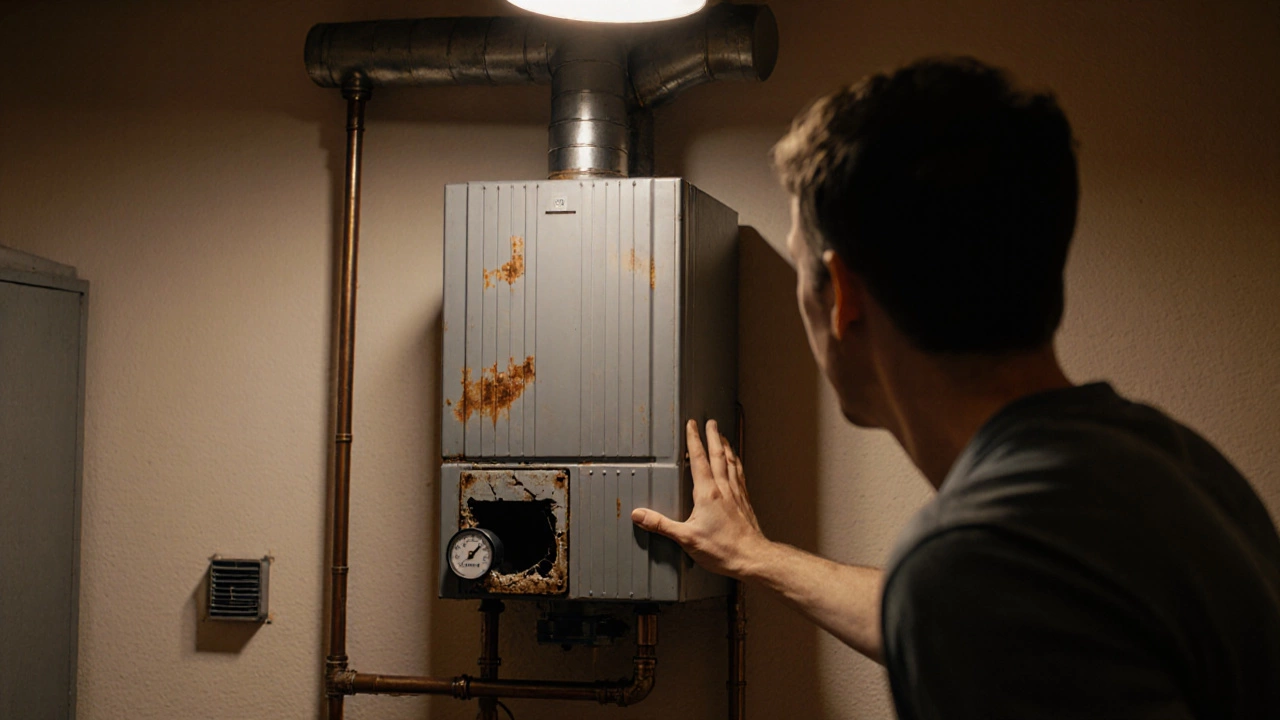When you hear the word Boiler is a closed‑loop heating system that generates hot water or steam to heat a home, the picture might be of a shiny new unit, but many homes still run on models that are two decades old. A 20‑year‑old boiler can feel like a relic - it clanks, it sputters, and the heating bill starts to creep up. The big question? Should you spend money fixing it or just replace it?
Quick Takeaways
- Typical repair costs for a 20‑year‑old boiler range from $300‑$1,200, while replacement starts around $3,500.
- Older units usually run 60‑70% of the efficiency of modern models, meaning higher energy bills.
- Safety risks (e.g., carbon monoxide leaks) rise sharply after the 15‑year mark.
- If the boiler fails the boiler repair cost test - costing more than 30‑40% of a new unit - replacement is usually smarter.
- Get at least two quotes, ask for a detailed parts list, and check the installer’s warranty before deciding.
Understanding a 20‑Year‑Old Boiler
Most residential boilers installed in the early 2000s were either conventional gas‑fire models or early‑generation oil units. Over time, three core components wear out:
- Heat Exchanger the metal chamber where water absorbs heat from burning fuel develops cracks and leaks.
- Combustion Chamber the space where fuel burns and creates hot gases can become corroded, reducing heat transfer.
- Efficiency Rating a percentage measuring how much fuel’s energy ends up as usable heat drops as seals, gaskets, and burners age.
When any of these parts start failing, you’ll notice louder operation, uneven heating, or error codes on the control panel.
What Drives the Repair Cost?
Breaking down the price tag helps you see where you might save:
- Labor: Certified technicians charge $90‑$130 per hour in New Zealand. A typical repair takes 2‑4 hours.
- Parts: A new heat‑exchanger can run $250‑$600; a faulty thermostat is $80‑$150.
- Diagnostics: Modern boilers have electronic controls; a diagnostic scan often costs $50‑$80.
- Travel & Call‑out fees: Some companies add a $30‑$50 fee for coming to a residential address.
Adding those up, you usually land between $300 and $1,200 for a single‑issue fix. If the technician discovers multiple problems, the bill can quickly climb toward $2,000 - a figure that starts to look a lot like a partial replacement cost.
Safety and Efficiency Concerns After 15 Years
Older boilers pose two big risks:
- Carbon Monoxide a colorless, odorless gas that can be lethal when leaked - cracked heat exchangers let it seep into your home.
- Reduced Energy Costs the amount you pay for heating each month - a 65% efficient boiler uses more fuel than a 95% model.
Both concerns can be mitigated with regular servicing, but the longer you wait, the higher the odds of a costly emergency.

When Repair Still Makes Sense
Here are scenarios where fixing the boiler is the smarter move:
- Minor part failure: A faulty pressure valve or a broken thermostat can be swapped for under $300.
- Excellent maintenance record: If the boiler has been serviced annually and the original heat exchanger is still intact, you’re likely getting a few more years of life.
- Budget constraints: If you can’t afford a $4,000 replacement now, a $800 repair buys you time while you save.
In these cases, the repair cost stays well below the 30‑40% rule of replacement price.
When Replacement Beats Repair
Replace the boiler if you encounter any of the following:
- Multiple component failures in one visit (heat exchanger, pump, and burner all need replacement).
- Efficiency rating below 70% - you’re paying extra fuel every month.
- Frequent breakdowns (more than two major fixes in three years).
- Expired warranty and the unit is out of service‑life - most manufacturers stop supporting boilers after 15‑20 years.
New condensing boilers installed in 2025 typically achieve 95% efficiency, cut fuel bills by 25‑30%, and come with a 5‑year parts guarantee.
Repair vs. Replace - Quick Comparison
| Factor | Repair | Replace |
|---|---|---|
| Up‑front Cost | $300‑$2,000 | $3,500‑$7,000 |
| Expected Lifespan After Work | 2‑5 years | 10‑15 years |
| Efficiency | 60‑70% | 90‑95% |
| Safety Risk | Moderate - depends on component health | Low - modern safety sensors |
| Installation Time | 1‑2 days | 3‑5 days |

How to Evaluate a Quote
When a technician gives you a number, ask for these details:
- Itemized parts list with part numbers.
- Labor hours broken down by task.
- Warranty coverage on parts and labor.
- Any rebates or government incentives for upgrading to a high‑efficiency model.
Transparency lets you compare offers objectively and spot hidden fees.
DIY Checks Before Calling a Pro
You can safely do a few quick tests:
- Check the pressure gauge - it should sit between 1.0 and 1.5 bar when cold.
- Listen for unusual rattling or whistling noises, which often signal a loose heat‑exchanger.
- Inspect the flue for soot buildup; excessive soot can indicate incomplete combustion.
If anything seems off, shut the boiler off and call a licensed plumber or heating specialist.
Making the Final Decision
Grab a piece of paper (or a notes app) and run this quick decision matrix:
- Calculate the repair estimate. If it’s more than 40% of a new unit’s price, lean toward replacement.
- Factor in efficiency loss. Estimate how much extra fuel you’ll spend each year because of a lower efficiency rating.
- Check safety. Any sign of carbon‑monoxide leakage or severe corrosion should tip the scale to replace.
- Consider the timeline. If you need reliable heat for the upcoming winter, a new boiler gives peace of mind.
Following these steps usually clears the fog and helps you choose the financially and safely sound option.
Frequently Asked Questions
How long should a boiler last?
A well‑maintained boiler typically serves 15‑20 years. After that, parts wear out and efficiency drops, making replacement more cost‑effective.
Can I repair a boiler myself?
Minor tasks like resetting a pressure valve or cleaning the flue can be DIY, but working on the heat exchanger, gas lines, or combustion chamber requires a licensed professional due to safety regulations.
What are the signs that a boiler needs replacement?
Frequent breakdowns, rising fuel bills despite regular servicing, visible rust on the heat exchanger, and any carbon‑monoxide alarm activation are strong indicators to replace.
Are there government rebates for new boilers in New Zealand?
Yes, the New Zealand government’s Energy Efficiency and Conservation Authority (EECA) offers rebates for high‑efficiency heating systems. Check the EECA website for the latest rates.
How can I test for carbon monoxide leaks?
Install a battery‑operated carbon‑monoxide detector near the boiler and on each floor. If the alarm sounds, evacuate and call emergency services immediately.

I am an expert in the services industry with a focus on appliance repair. My passion lies in understanding how things work and educating others in simple, engaging ways. This enthusiasm fuels my writing, where I delve into topics around appliance maintenance and troubleshooting. I aim to make these subjects clear and accessible to all readers.